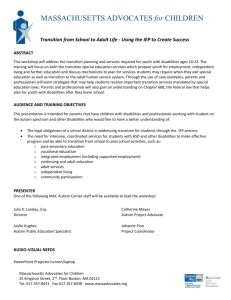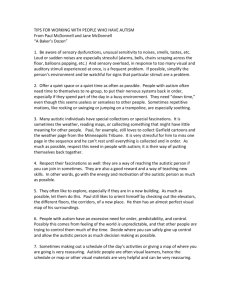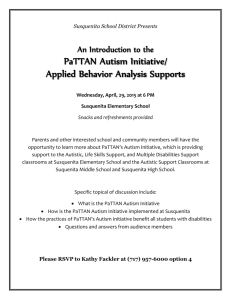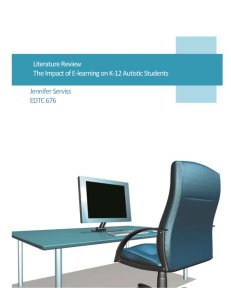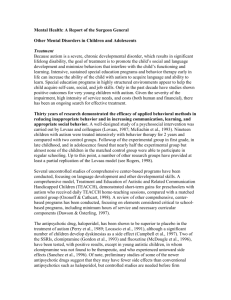Planet Autism
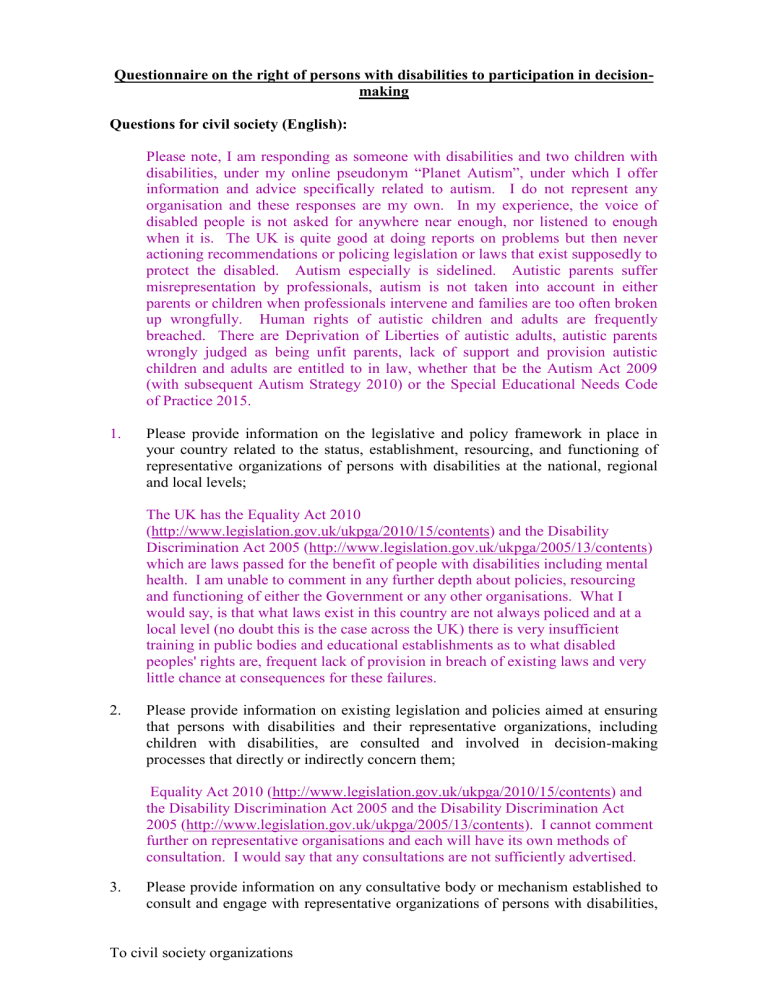
Questionnaire on the right of persons with disabilities to participation in decisionmaking
Questions for civil society (English):
Please note, I am responding as someone with disabilities and two children with disabilities, under my online pseudonym “Planet Autism”, under which I offer information and advice specifically related to autism. I do not represent any organisation and these responses are my own. In my experience, the voice of disabled people is not asked for anywhere near enough, nor listened to enough when it is. The UK is quite good at doing reports on problems but then never actioning recommendations or policing legislation or laws that exist supposedly to protect the disabled. Autism especially is sidelined. Autistic parents suffer misrepresentation by professionals, autism is not taken into account in either parents or children when professionals intervene and families are too often broken up wrongfully. Human rights of autistic children and adults are frequently breached. There are Deprivation of Liberties of autistic adults, autistic parents wrongly judged as being unfit parents, lack of support and provision autistic children and adults are entitled to in law, whether that be the Autism Act 2009
(with subsequent Autism Strategy 2010) or the Special Educational Needs Code of Practice 2015.
1.
Please provide information on the legislative and policy framework in place in your country related to the status, establishment, resourcing, and functioning of representative organizations of persons with disabilities at the national, regional and local levels;
The UK has the Equality Act 2010
(http://www.legislation.gov.uk/ukpga/2010/15/contents) and the Disability
Discrimination Act 2005 (http://www.legislation.gov.uk/ukpga/2005/13/contents) which are laws passed for the benefit of people with disabilities including mental health. I am unable to comment in any further depth about policies, resourcing and functioning of either the Government or any other organisations. What I would say, is that what laws exist in this country are not always policed and at a local level (no doubt this is the case across the UK) there is very insufficient training in public bodies and educational establishments as to what disabled peoples' rights are, frequent lack of provision in breach of existing laws and very little chance at consequences for these failures.
2.
Please provide information on existing legislation and policies aimed at ensuring that persons with disabilities and their representative organizations, including children with disabilities, are consulted and involved in decision-making processes that directly or indirectly concern them;
Equality Act 2010 (http://www.legislation.gov.uk/ukpga/2010/15/contents) and the Disability Discrimination Act 2005 and the Disability Discrimination Act
2005 (http://www.legislation.gov.uk/ukpga/2005/13/contents). I cannot comment further on representative organisations and each will have its own methods of consultation. I would say that any consultations are not sufficiently advertised.
3.
Please provide information on any consultative body or mechanism established to consult and engage with representative organizations of persons with disabilities,
To civil society organizations
including information about their composition, criteria for membership
(nomination, appointment, election, etc.) and functioning;
The Government has consultations sometimes but these are not advertised well.
They are usually found out about in my experience, incidentally through 3 rd parties. Here is one such consultation: https://www.gov.uk/government/uploads/system/uploads/attachment_data/file/409
816/Document.pdf
4.
Please provide information on the efforts undertaken at national, regional and/or local levels to strengthen the capacity of representative organizations of persons with disabilities, in order to facilitate their participation in legislative, policy and other decision-making processes;
Unable to comment on this. I believe that any consultation is so far, only tokenism. Disabled people do not have sufficient voice.
5.
Please explain whether and how persons with disabilities participate in monitoring the implementation of the United Nations Convention on the Rights of Persons with Disabilities (art. 33, para. 3), and in the nomination of experts to the
Committee on the Rights of Persons with Disabilities (art. 34, para. 3);
I have never been aware that there has been participation. That in itself is concerning.
6.
Please identify the main challenges faced by the diversity of persons with disabilities in participating in mainstream and disability-specific decision-making processes at the national, regional and local levels, including challenges faced by persons who experience multiple discrimination (e.g., on the basis of disability, age, gender, ethnic origin, geographical location).
Speaking for autistic people in the UK, there is widespread lack of reasonable adjustments which are, according to the law, meant to be anticipatory.
Widespread ignorance about what reasonable adjustments are required, means they are not offered. Autism ignorance is widespread here. There is no mandatory training of public sector staff, despite there being legal requirements on them to provide the reasonable adjustments. When people have “highfunctioning” autism, there seems to be an assumption that people are capable of speaking up for themselves, capable of coping because they haven't spoken up to say otherwise, capable of travelling to a venue, according lack of eligibility for social care support to enable participation etc. People with autism often prefer communicating in writing, there is usually no facility for this if a physical meeting is required. Skype or other technologies could be utilised to make it easier for people with these difficulties. Many people with autism suffer physically limiting conditions, such as gastro-intestinal disorders, Ehlers Danlos Syndrome, epilepsy etc. which only adds to their difficulties. Disabled people themselves are far too rarely consulted. Autistic people like to say “nothing about us without us” but even when a token autistic person is included, there has never been a widespread advertising of the call for participation.
PAGE 2
7.
Please provide information on the existence of organizations of persons with disabilities in your country, including organizations of children and women with disabilities, as well as their composition and internal decision-making processes and procedures;
There are multiple organisations, many for each type of disability. The major UK autism organisation is the National Autistic Society http://www.autism.org.uk/ and I cannot speak for their composition or internal decision-making processes.
Here is more information about them: http://www.autism.org.uk/news-andevents/about-the-nas/documents-and-reports.aspx They receive Government grants https://en.wikipedia.org/wiki/National_Autistic_Society and this means they will be unlikely to challenge the status quo too much as they won't want to bite the hand that feeds them.
8.
Please identify the main challenges faced by the diversity of persons with disabilities as members of mainstream or disability-specific non-governmental organizations, and in participating in the activities of such organizations, including challenges faced by persons who experience multiple discrimination.
Speaking for autistic people in the UK, there is widespread lack of reasonable adjustments which are, according to the law, meant to be anticipatory.
Widespread ignorance about what reasonable adjustments are required, means they are not offered. Autism ignorance is widespread here. There is no mandatory training of public sector staff, despite there being legal requirements on them to provide the reasonable adjustments. When people have “highfunctioning” autism, there seems to be an assumption that people are capable of speaking up for themselves, capable of coping because they haven't spoken up to say otherwise, capable of travelling to a venue, according lack of eligibility for social care support to enable participation etc. People with autism often prefer communicating in writing, there is usually no facility for this if a physical meeting is required. Skype or other technologies could be utilised to make it easier for people with these difficulties. Many people with autism suffer physically limiting conditions, such as gastro-intestinal disorders, Ehlers Danlos Syndrome, epilepsy etc. which only adds to their difficulties. Disabled people themselves are far too rarely consulted. Autistic people like to say “nothing about us without us” but even when a token autistic person is included, there has never been a widespread advertising of the call for participation.
PAGE 3
